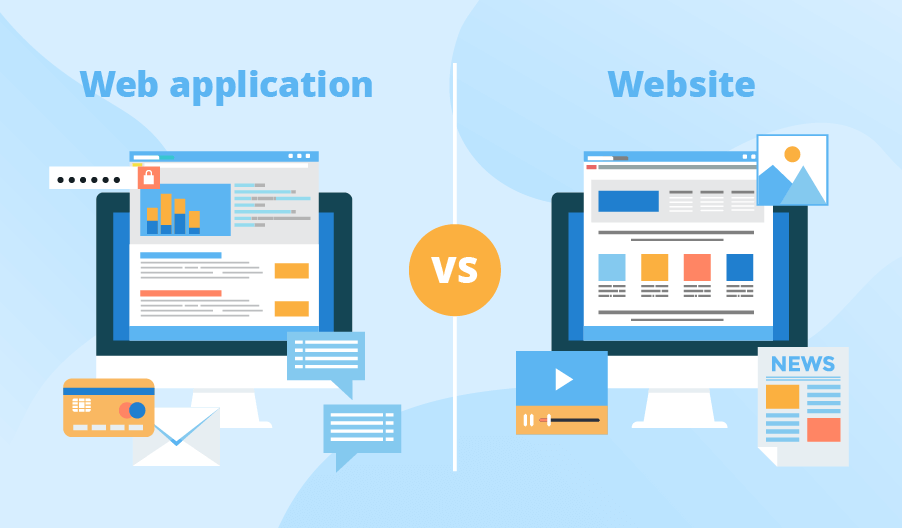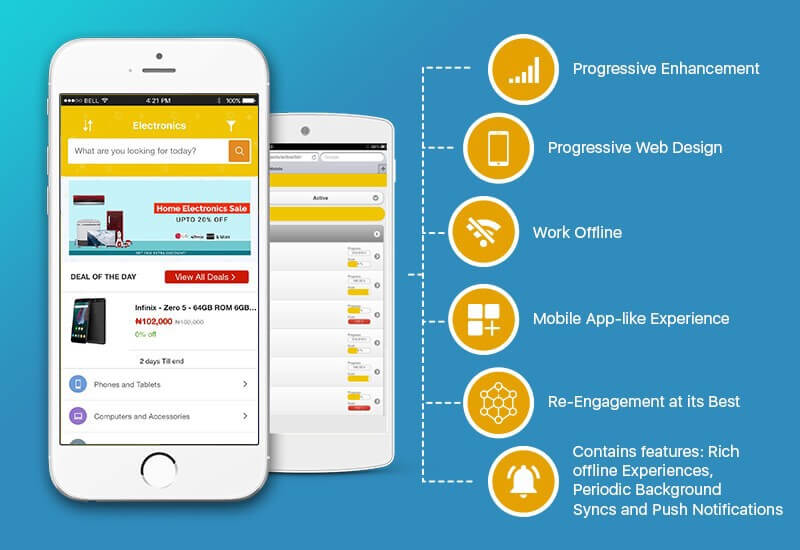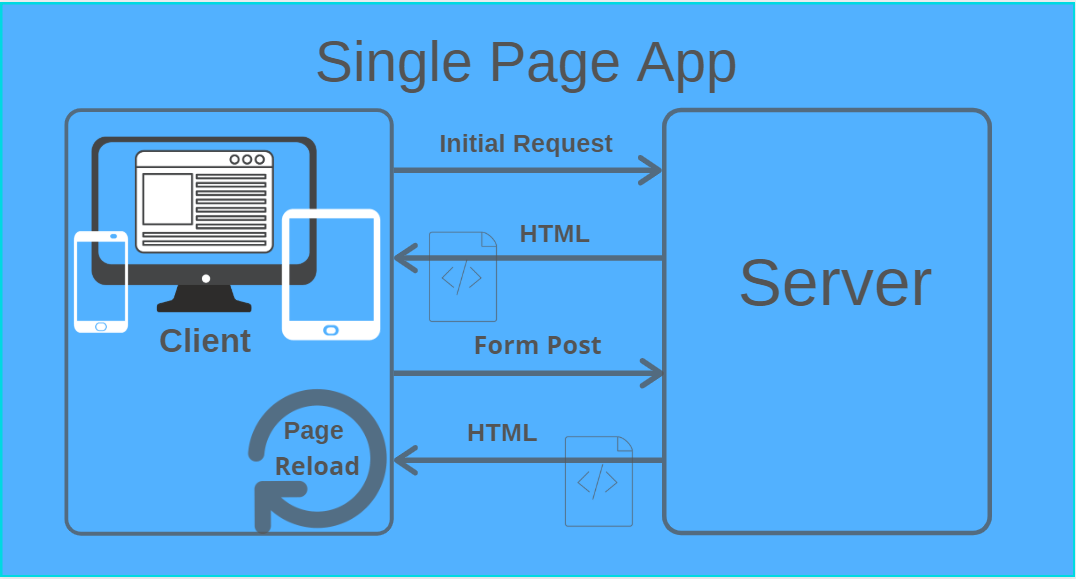Website vs. Web Application: Which is Right for Your Business?
How many times have you searched or scrolled a web page, wondering if you’re on a website or a web application? Probably never! Well, this is not surprising, as the difference between a website and a web application? Probably never! Well, this is not surprising, as the difference between a website and a web application is not an issue for the average user.
However, the website vs. web application impasse benefits momentum when choosing to operate your business online. Do you only want to spread the brand name of the business? Or do you want users engaging with the webpage by searching and clicking on buttons and sending requests to the server? Your answers will determine your final choice.
This article will reveal the difference between a web application and a website. You’ll also learn how to choose between these options, based on your business requirements.
What is a Website?
A website is a collection of interlinked Web Pages dragged together under a single domain. It is a collection of the content presented on many web pages that share the same web address.
Websites are informative and static, since their web pages are not updated dynamically. Websites usually have a homepage or index page, navigation bar, header, and footer. They may be in the form of landing pages, blogs, and portfolios.
Websites are used for various purposes, like digital media, Government Departments, e-commerce sites, educational websites, and forums. An example of a website is the current page you are reading now – ISH Technologies’ blog. It provides information, with some basic interactive features.
Websites can carry identifiable domains:
• .com (Commercial websites)
• .gov (Government agency websites)
•.org (Non-profit organisations’ websites)
• .info (Information sites)
•.edu (Educational institutions’ websites)
What is a Web Application?
A web application is computer software or application software that is accessed via a web browser and linked to a database to offer an interactive user-customisable experience.
A web application is a website with more interactive functions and elements intended for user engagement. Web applications operate by responding to a user’s action or request sent to the web server. Unlike websites, web applications perform certain functions rather than simply displaying content or delivering information. Examples of web applications are, Google Analytics, Twitter, and YouTube.
Web apps leverage the web server to process complex user requests. Thus, web applications can perform many actions:
- Shopping
Messaging
Account verification
Making money transactions
Booking hotel room
Booking online taxis and
Ordering food
Different Web Applications
The line separating a website and web application is becoming more and more fuzzier. The main reason is the arrival of new “hybrid” frameworks, like Progressive Web Apps (PWAs) and Single-Page Applications (SPA).
Progressive Web Apps (PWAs)
A progressive web application is a framework, which runs on the web server, but leverages a range of functions and feature extensions, and is typically used for mobile applications. The paramount quality of PWAs is that they can work in offline mode and send push notifications.
Single-page application (SPA)
A single page application (SPA) is a static web page, which combines some interactive and upgradable elements. The best example of a SPA is your email inbox where the header and sidebar remain static while you navigate the page. You can open and close emails, create new mail and send and get notifications – all on a single page.
Questions to ask before Building a Web Application or Website
Before diving into web development, there are a few things you should consider. Here they are:
What is your purpose?
A website is beneficial when you plan to inform your user about your products and services. If you are launching a mobile app, you could build a simple landing page to promote the application.
For example, a financial services provider uses one landing page with a subscription form to engage its users and promote its product.
Meanwhile, a web application is more interactive and offers more opportunities for users to interact with the dashboard or displayed content. If you are focusing on deeper user involvement, a web application might be the better option for you.
Let’s look at some examples of web applications – we all are familiar with Google Apps, which include Gmail, Google Sheets, Google Docs, and Google Slides. These office work applications are dynamic and upgradeable, allowing the entire team to access important files and make changes.
Another example of a web application is real estate apps. Users can search and view accommodation options, archive them, and arrange meetings with real estate agents.
You will save on application development costs with us and there will be no surprise costs.
How much should you invest?
In terms of cost and development, websites are cheaper, faster, and more straightforward than web applications. Static and simply informative, websites are ed using simple style sheet languages – HTML, CSS, JavaScript, or some readymade templates. Thus, it does not take much effort or money to build a website.
Web applications need a more serious approach, including the discovery phase, UX design, front-end, and back-end development. Many programming languages may be used, such as PHP, Laravel, CodeIgniter, Angular, or React. Thus, web application development is a more complex task for development professionals. Usually, a team of developers tasked with building web applications includes a product manager, front-end and back-end developer, QA expert, and web designer.
How do you view your product?
How do you envisage your product from a long-term perspective? What kind of features and functionalities will it include? Answers to these questions transform into your product’s vision and your choice between a web application and a website. Consider these features when making up your mind:
Complex calculations
If you want your application to handle complex calculations, a web app is a better choice. The main reason is that a web application uses a web server to process users’ actions or requests. So if a user requests the web server to make a calculation, it can easily handle this task.
As for a website, the calculations intended to be processed on the device will consume a lot of device and power storage space.
Push notifications
You can have push notifications on both a web application and a website. Push notifications are clickable messages, which encourage a user to take action.
While push notifications are more than that of an application attribute, websites can effectively leverage them to add user interaction without creating a full-fledged app.
Instant updating
At first glance, instant page updating is only feasible for web apps. Yet, websites can also have their webpage updated, but only by a website administrator in a website building software.
When it comes to automatic web page updates, web applications are the right way to go.
Here is a short rundown on other things to keep in mind before starting a web development task.
When to choose a website?
The difference between web applications and websites is clear. A website is like a visiting card of your product or service. It can get more leads, gain new clients, promote brand identity, and increase sales.
Websites are relatively low cost and simple to create, making them a good choice if you want to validate your business idea before investing in a website application.
When to choose a web application?
Whether it is a shopping application, online store, booking application, or a customer relations management system – you can execute any product idea via a website app. If you want your product to be more interactive, user engaging, advanced, and profitable, then a web application is the right choice.
Conclusion
Both a website and web app are excellent tools to lead business online. The criteria for choosing between the two are the type of your business and its purposes.
If you have a business idea but cannot make up your mind on its realisation, we are here to help. Contact us to discuss your project idea – this could be the start of a new journey.






No comments to show.